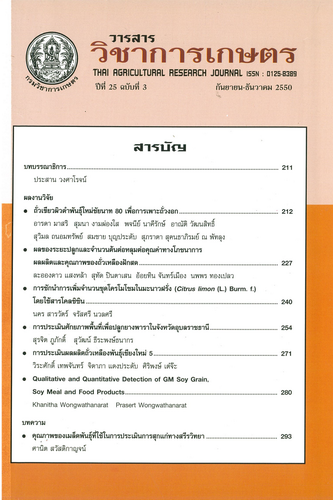การชักนำการเพิ่มจำนวนชุดโครโมโซมในมะนาวฝรั่ง (Citrus limon (L.) Burm. f.) โดยใช้สารโคลซิซิน
DOI:
https://doi.org/10.14456/thaidoa-agres.2007.18คำสำคัญ:
โคลซิซิน, โพลีพลอยด์, มะนาวฝรั่งพันธุ์, พิมพ์พรบทคัดย่อ
ศึกษาผลงานของสารโคลชิชินต่อความงอกของเมล้ด การพัฒนาการของต้นกล้า และการเพิ่มจำนวนชุดโครโมโซมในมะนาวฝรั่งพันธุ์พิมพ์พร เพื่อปรับปรุงพันธุ์จากการเพิ่มชุดโครโมโซม โดยดำเนินการทดลองที่เรือนกระจก ภาควิชาพืชศาสตร์ คณะทรัพยากรธรรมชาติ มหาวิทยาลัยสงขลานครินทร์ วิทยาเขตหาดใหญ่ ในช่วงเดือนมิถุนายน พ.ศ. 2548 ถึงเดือนมกราคม พ.ศ. 2550 โดยแบ่งเป็น 2 การทดลองคือ การทดลองแรกโดยที่นำเมล็ดที่แกะเปลือกหุ้มเมล็ดมาแช่ในสารละลายโคลชิชินที่ความเข้มแข้น 0 0.5 1.0 1.5 และ 2.0%) เป็นระยะเวลา 36 ชม. พบว่า เปอร์เซ็นต์ความงอก ความสูงของต้นกล้า ขนาดใบ และจำนวนใบจากต้นที่ได้รับสารโคลซิซินทุกความเข้มข้นมีค่าน้อยกว่าต้นในชุดควบคุม ค่า LD50 ของสารโคลซิซินในการแช่เมล็ดนาน 36 ชม. มีค่า 1.88% อย่างไรก็ตาม เมื่อทำการตรวจนับจำนวนโครโมโซมจากปลายราก ไม่พบการเพิ่มจำนวนโครโมโซม ส่วนการทดลองที่สองใช้สารละลายโคลซิซินกับปลายยอด โดยทำการหุ้มปลายยอดต้นกล้าอายุ 8 เดือน ด้วยสำลีจุ่มสารละลายโคลซิซินที่ความเข้มข้นต่าง ๆ กันที่ 0 0.5 1.0 และ 2.0% เป็นเวลา 24 ชม. ซึ่งแต่ละความเข้มข้นใช้จำนวน 25 ปลายยอดพบว่าเปอร์เซ็นต์การผลิตยอดใหม่ ความยาวยอด ความกว้างและความยาวของใบ และจำนวนใบของปลายยอดที่ไม่ได้รับสารโคลซิซินมีค่ามากที่สุด ส่วนค่า LD50 ของสารโคลซิซินมีค่า 0.94% เมื่อตรวจนับจำนวนโครโมโซม พบว่าการให้สารโคลซิซินที่ปลายยอดที่ความเข้มข้น 1.0 และ 2.0% อย่างละหนึ่งต้น ประสบความสำเร็จในการเพิ่มจำนวนโครโมโซม แต่เป็นแบบมิโซพลอยด์ คือที่ความเข้มข้น 1% พบจำนวนโครโมโซม 2 ชุด (2n=2x=18) , 3 ชุด(2n=3x=27) และ 4 ชุด (2n=4x=36) ในขณะที่อีก 1 ต้น พบจำนวนโครโมโซม 2 และ 3 ชุด
ดาวน์โหลด
เผยแพร่แล้ว
รูปแบบการอ้างอิง
ฉบับ
ประเภทบทความ
สัญญาอนุญาต
ลิขสิทธิ์ (c) 2017 วารสารวิชาการเกษตร (Thai Agricultural Research Journal)

อนุญาตภายใต้เงื่อนไข Creative Commons Attribution-NonCommercial-NoDerivatives 4.0 International License.
วารสารวิชาการเกษตร



